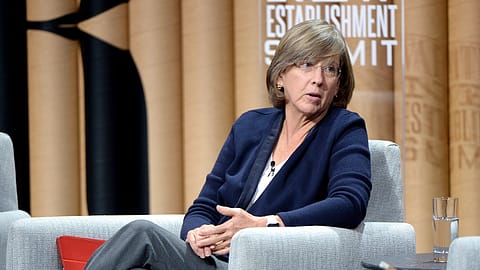Mary Meeker’s AI deep dive: Here’s how AI is reshaping business, geopolitics, and the internet; key trends here
From inference cost collapses to internet overhauls, Mary Meeker’s landmark AI report lays out how artificial intelligence is disrupting business, geopolitics, and global digital behaviour. India emerges as a key node in this realignment.

Venture capitalist Mary Meeker, once dubbed the “Queen of the Internet”, released her first trends report since 2019 last week. This time, the focus of the report was artificial intelligence (AI). The 340-page deep dive, published by her firm BOND, captures the extraordinary speed, scale, and consequences of AI’s rise, from plummeting inference costs and explosive user growth to evolving job roles and intensifying geopolitical competition.
Meeker uses the word “unprecedented” 64 times, underscoring her central argument that this AI wave is unlike any previous tech revolution. As AI becomes the foundational layer of the digital economy, Meeker’s message is clear: the revolution has already begun, and the next five years will be critical. Here’s a lowdown on the key insights from the report, and what they mean for India, both as a fast-growing market and a strategic provider in the global AI ecosystem.
Forecasts for the future of AI
At the heart of the report is a forecast of a slew of tasks AI will likely handle better or replace humans by the end of the decade. These shifts, Meeker notes, will not come in one dramatic sweep, but in steady, incremental waves.
From answering questions to writing and coding
AI will become the default knowledge interface, replacing Google-like link scanning with fast, fluent answers tailored to context. From emails to reports, low-stakes writing will largely be done by AI, with humans in a reviewing or approving role. Tools like GitHub Copilot already turn natural language into code. By 2030, Meeker predicts AI will prototype apps from scratch based on simple prompts. AI copilots will record meetings, summarise key points, and automatically draft the next steps.
Managing, explaining and hyper-personalisation
Recommended Stories
AI agents will read, filter, and respond to emails — long before you open them. From legal contracts to lab reports, “contextual AI” will simplify technical content in real time. Beyond news and shopping, AI will tailor services across health, finance, and education.
Coaching, remembering and navigating real life like a human
Expect AI-powered fitness, learning, and mental health apps to become your most persistent cheerleaders. AI will enable real-time decision engines based on context like location, urgency, and even emotional cues. No more resetting conversations — AI will remember past chats, preferences, and your tone of voice.
Globally AI is booming, yet monetisation remains elusive
(INR CR)
AI usage is now growing exponentially across metrics like API calls, inference requests, and compute hours. Meeker highlights how AI adoption is not only rapid but also global. India is now the largest mobile user base for ChatGPT (13.5%), outpacing the US (8.9%) and Germany (3%). It is also a major user of China’s DeepSeek. ChatGPT reached 800 million weekly users in just 17 months — faster than the iPhone or the internet.
China is leading the open-source AI race, with major models like DeepSeek-R1, Baidu’s Ernie 4.5, and Alibaba’s Qwen-32B pushing performance boundaries. Meeker notes this rivalry could define future standards and dependencies, akin to the Cold War space race.
Amid massive AI investments and high valuations which are positives for consumer interests for now, the AI is seeing to be divided between two camps. Closed models (e.g., GPT-4, Claude) dominate in performance and enterprise usage but lack transparency. Open models (e.g., Llama, Mixtral) drive innovation in languages, sovereign tech, and grassroots deployment.
While model training costs are soaring — up to $1 billion for the largest models — inference costs have plummeted by 99% in two years. Nvidia’s latest Blackwell chips are 105,000x more efficient per token than their 2014 counterparts. Google and Amazon are also aggressively scaling their custom silicon.
Despite the capital intensity, Meeker says the upside is transformative. AI is no longer just powering apps; it's guiding autonomous vehicles, factory robots, and enterprise workflows. Yet monetisation remains elusive. Meeker notes the median revenue per user across major AI platforms is just $23, far below the $80 earned by Alphabet or the $40 by Meta. OpenAI, despite massive traction, earns about $10 per user annually. “The usage supercycle is real, but so is the cash burn,” she writes. In 2024 alone, the Big Six — Apple, NVIDIA, Microsoft, Alphabet, Amazon, and Meta — invested $212 billion in AI CapEx, a 63% year-on-year jump.
Reordering the Internet
Perhaps most radically, Meeker suggests the AI interface will redefine the internet itself. For billions yet to come online, their first experience may not involve a search engine or browser — but a native-language AI assistant. This shift, she argues, could upend traditional tech hierarchies. In her final analysis, AI leadership is strategic. “The country or company that builds the most trusted, capable AI systems may shape not just the future economy, but the future world order.”